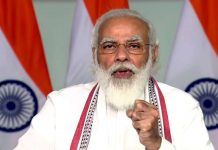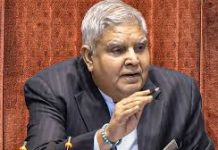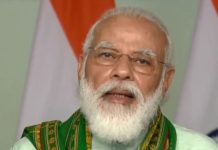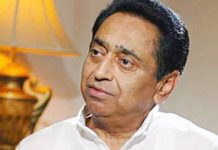The Congress-NC alliance leaves out the PDP, which otherwise is a member of the INDIA bloc, apparently because NC doesn’t want the latter to further nibble away at its share of seats in the valley. But this also leaves the PDP free to contest on all seats in the UT. A report by Riyaz Wani
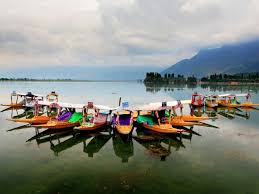
When Rahul Gandhi visited a famous Srinagar ice cream parlour on the evening of August 22, and interacted with the people there, it, in a sense, launched the Congress’s Assembly election campaign in the Valley. The video of Gandhi having ice cream at the parlour went viral in Kashmir and followed immediately after the Congress signed an alliance agreement with the National Conference which also included CPI(M).
Earlier in the day, Gandhi and the Congress president Mallikarjun Kharge held a meeting with National Conference (NC) president Dr Farooq Abdullah and vice-president Omar Abdullah.
“The alliance is on track and will work successfully. The people of J&K have suffered immensely without an elected government for years. We are committed to restoring statehood with all powers,” Dr. Abdullah said after the meeting.
Kharge expressed confidence in the alliance’s prospects, expecting the Congress to secure 40 to 45 seats in the elections. He assured the people of Jammu and Kashmir that the Congress would work to protect their land, forests, and other rights.
Under the terms of the agreement, the two parties have finalized a seat-sharing agreement on all 90 seats in the union territory, leaving, however, one seat to the CPI(M)’s M Y Tarigami, who will contest from his South Kashmir hometown Kulgam. The NC will fight on a predominant majority of 47 seats in Kashmir Valley and the Congress will contest a lion’s share of 43 seats in Jammu. This, the parties expect, will ensure that the votes are not split which would give advantage to the BJP, a force to reckon with in Jammu division – that is, despite some recent disaffection in the region with the saffron party’s policies.
The Congress-NC alliance leaves out the PDP which otherwise is a member of the INDIA bloc. This is believed to have been done at the urging of the NC which doesn’t want the PDP further nibble away at its Valley share of seats. But this also leaves the PDP free to contest on all seats in the UT. The party could especially be a challenge in South Kashmir which remains its stronghold. In the District Development Council polls in 2020, the PDP had won 27 seats while the NC had secured 67.
Ram Madhav is back
Ram Madhav, the architect behind the PDP-BJP ‘Agenda of Alliance’ in 2015 has once again been appointed as the BJP’s pointman for J&K. He is now the party’s co-poll incharge along with Union Minister G Kishan Reddy, for the Assembly elections. Madhav’s advantage is that he knows leaders across the parties and will thus be able to keep the lines of communication open with them until after the elections are over and the government formation begins.
Incidentally, Madhav was also in Kashmir around the time Gandhi and Kharge were here. But not much was known about his activities in the summer capital of the UT. Kashmir observers contend that his appointment shows that like the Congress, the BJP is also looking for alliance partners in the UT, more so in the valley. Although the saffron party is supposed to have an understanding with the parties such as the Apni Party, Democratic Progressive Azad Party and the People’s Conference, none of them is publicly willing to acknowledge it for fear of losing support. All these parties not only failed to win a single seat in the recent parliamentary elections but also couldn’t enthuse Kashmiri voters. In terms of vote tallies they finished last in the seats they contested from.
But more than a pre-election alliance, Madhav could be expected to look at a post-election scenario. Should the BJP win a majority of seats in Jammu division, where it retains significant following despite a rejuvenated Congress making inroads recently, Madhav could be hoped to explore options with the parties in the Valley.
“After the polls, the parties are unlikely to be as inhibited about joining hands with the BJP as they are now,” said a political analyst. “In case of a scenario where the BJP does well in Jammu, Kashmir-based parties will have little option but to form an alliance with the saffron party. But just in case, the Congress does well, then Kashmiri parties won’t touch the BJP by a ten-foot pole.”
Article 370, statehood at the centre
The manifestos issued by the major Kashmiri parties have expectedly given pride of place to the demands for restoration of Article 370 and statehood. Harking back to the special status that the erstwhile state once had is certain to drive politics of the union territory for a long time to come. Pressing this demand has now become a condition for political survival for Kashmiri parties. Any party that appears soft on the demand will find it harder to convince people about its bonafides. This was clear in the recent parliamentary polls: the parties that were seen ambivalent on the demand bit the dust.
That said, demand for special status for J&K even when it is forcefully pressed by any party in the UT is largely rhetorical in nature. It succeeds the earlier demands for autonomy and self rule, which principally again were slogans to mobilize the public support.
The NC Vice President Omar Abdullah likened the demand for the reinstatement of Article 370 to the BJP’s longstanding pursuit of its abrogation, which the latter finally fulfilled on August 5, 2019.
“We will continue to fight politically for Article 370. The manifesto is an assurance that we will not stay silent on these issues,” Omar said. “The Supreme Court has in the past upheld Article 370 three times. Can’t we expect a situation where the SC will change its recent decision. The BJP did not accept defeat despite three orders by the SC in favour of Article 370. Why should we?”
However, the NC’s alliance partner, Congress, is silent on the demand. Both Gandhi and Kharge have only been calling for the reinstatement of statehood. “It is our priority in the Congress Party and also in the INDIA alliance to restore statehood to Jammu and Kashmir as soon as possible,” Gandhi said in Srinagar.
“This is the first time since independence that a state has become a union territory. This has never happened before. Union territories have become states, but it is the first time that a state has become a union territory,” he added.
Already, Union home minister Amit Shah launched a scathing attack on the Congress party over its alliance with the National Conference (NC) for the upcoming Jammu and Kashmir Assembly elections, questioning its stance on key issues outlined in the NC’s poll manifesto.
Shah questioned whether the Congress endorsed the National Conference’s promise to reinstate a separate flag for Jammu and Kashmir? He also highlighted the National Conference’s commitment to restoring Article 370 and 35A, which had previously granted special autonomy to the region, asking if the Congress party supports this move, suggesting it could lead Jammu and Kashmir back into an “era of unrest and terrorism.”
Overall, the election holds interesting possibilities for Jammu and Kashmir. The NC expects to secure a majority of its own or at least emerge as the largest single party. The BJP expects to repeat the 2014 performance. In fact, with fresh delimitation giving it an edge in many more constituencies in Jammu, the party expects to even better its 2014 tally of 25 seats. It is also possible that the newly rejuvenated Congress under Rahul Gandhi would once again make inroads into Jammu and undercut the BJP. In that case, the BJP would no longer be able to assert a role in the future elected government. That said, in the Valley, the NC could face a tough challenge from the PDP, which remains relevant and also from Rashid’s Awami Ittehad Party. The field as of now is wide open.








